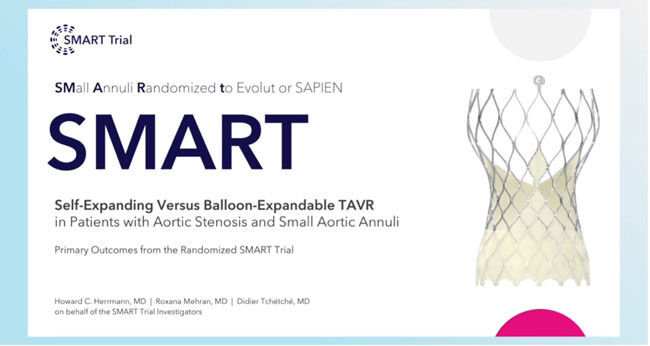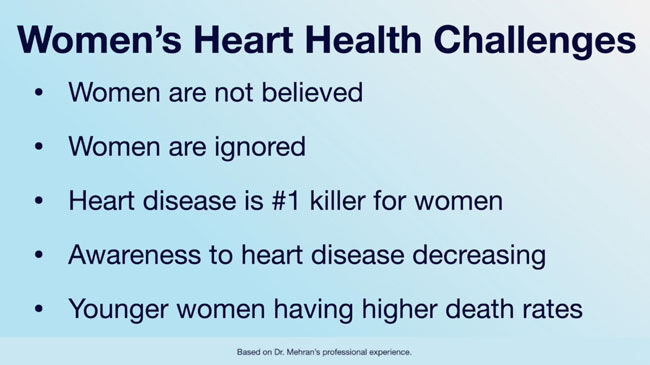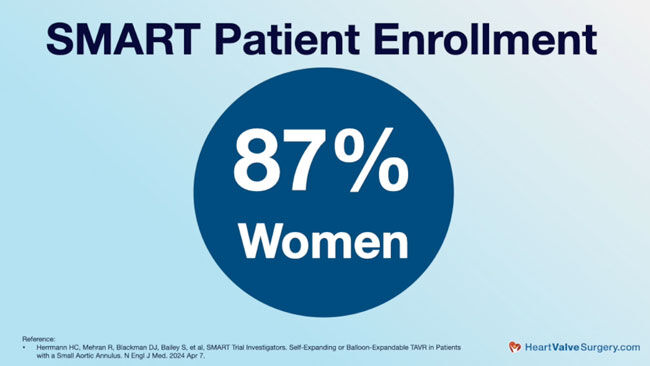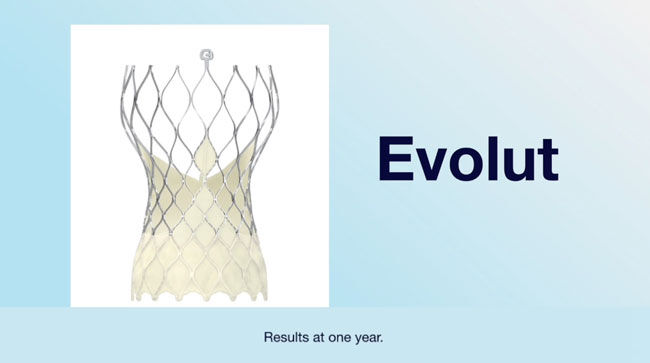Women’s Heart Health Alert: SMART Clinical Trial Reveals Medtronic Evolut TAVR Treatment Advantage for Aortic Stenosis
Written By: Allison DeMajistre, BSN, RN, CCRN
Medical Expert: Roxana Mehran, MD, Professor of Medicine, Director of Interventional Cardiovascular Research and Clinical Trials, Mount Sinai School of Medicine, New York
Reviewed By: Adam Pick, Patient Advocate, Author & Website Founder
Published: December 1, 2024
A woman’s heart is not simply a small version of a man’s heart. There are stark differences in size, structure, and function.1,2 Yet, for decades, most clinical heart research and diagnostic criteria have centered around men. This lack of differentiation has led to mis-diagnosis and under-treatment of women with symptoms of heart disease.
Aortic stenosis is a prime example of the structural heart differences in men and women. Women tend to have a smaller aortic annulus, or valve opening, than men. This anatomical difference has sometimes led to considerable challenges for doctors and how they choose to treat aortic stenosis. Despite women’s longer life expectancy, once impacted by severe aortic stenosis, they suffer from higher mortality than men, even after matching for age.3 However, if women do receive treatment, they have a lower mortality rate and excellent outcomes with TAVR compared to SAVR.4,5
Until recently, there has been limited randomized controlled data regarding the treatment for aortic stenosis for patients with a small aortic annulus, most of whom are women. Medtronic’s SMART Clinical Trial results now shed light on this patient population. To learn more, we recently traveled to the Women’s Heart Health Congressional Day in Washington, D.C., where we met with Dr. Roxana Mehan, who is a Professor of Medicine and Director of Interventional Cardiovascular Research and Clinical Trials at Mount Sinai School of Medicine in New York City, New York.
Key Learnings About The SMART Clinical Trial

Here are the important insights shared by Dr. Mehran during our interview:
- What should patients know about Women’s Heart Health Congressional Day? “It’s historic if you think about it,” said Dr. Mehran. “I don’t remember that we would have a whole day dedicated to women’s heart health on The Hill, and here we are talking to our representatives from around the country about the importance and the crucial time point we’re in. We are at an inflection point of saving women’s lives.”

- Based on your professional experience, what are the fundamental challenges for women with heart disease? “Well, it’s a huge challenge,” said Dr. Mehran. “Women aren’t believed. They come in with really serious symptoms, and they’re ignored. Heart disease is the number one killer, yet awareness that heart disease is the number one killer has decreased over the last couple of decades. We’re losing lives every few seconds, and we’re starting to see, especially in younger women, higher death rates. We have to put a stop to that.”
- Studies show that women are underdiagnosed, under-treated, and under-represented in clinical trials. Is this accurate and what can patients learn from this information? “It’s totally accurate when they come in with a heart attack or symptoms of a heart attack. They’re often under-recognized, pushed aside, told they’re fine and to go home,” said Dr. Mehran. “On the clinical trial side, almost every device and drug out there has been studied in white men. Do we have answers for women? Do the results we use for our guidelines and how clinicians make decisions relate to women? Many don’t.”,1, 2,6,7
- Is it true that about 35 percent of women who are indicated for surgery because of aortic stenosis don’t get an aortic valve replacement? Mehran said, “Yes. Aortic stenosis is a disease that’s prevalent in women. Yet, the diagnosis is not well done. When there is a diagnosis, they wait longer to be referred for definitive therapy, which is an aortic valve replacement, whether it’s going to be surgery or a minimally invasive approach, with what we call TAVR. These are the big questions that women should be asking their doctors.”7
- Does heart valve disease impact women differently than men? “Absolutely,” said Dr. Mehran. “Women are not small men. We keep hearing this, and I keep saying it. The pathology or the way our valves are blocked differs greatly from how men’s valves get blocked. We know that there are important sex differences. The way the heart responds to the blocked valve is different than in men.” Dr. Mehran explained that looking at women’s distinct biology is imperative to understand how best to treat them.1, 2

- What is the SMART Clinical Trial, and how does it relate to today’s event? Dr. Mehran said, “The SMART Clinical Trial is a pivotal trial that we are very proud of.” She explained that for the first time, they looked at aortic stenosis in patients with small annuli, which is more prevalent in women. “For the first time, we enrolled almost 90 percent of women, and now we have an answer for our women who have aortic stenosis with a small annulus and which valve they should get.”8

- What were the key one-year findings of the SMART Clinical Trial? “We showed that the Medtronic Evolut self-expanding valve had similar clinical outcomes with the balloon-expandable SAPIEN valve, but with the very important difference of how patients felt,” Dr. Mehran explained. “They felt better with the Evolut valve. As we followed these patients with the ultrasound, it looked like their valves were more open, more functional, and better regarding how much blood was getting to the rest of their bodies. It is a very important finding, and over time, I think it will show a difference in the clinical outcome.”
- TAVR risks may include, but are not limited to, death, stroke, damage to the arteries, bleeding, and need for permanent pacemaker.
- What can patients in the HeartValveSurgery.com community do to improve women’s heart health? Mehran explained that patients with aortic stenosis can ask their doctor these critical questions:
- Is my heart valve small?
- Is my annulus small?
- Which valve will you put in?
- Does the valve open by itself?
- Does the valve open with a balloon?
Thanks Dr. Mehran, Mount Sinai and Medtronic!
On behalf of patients at HeartValveSurgery.com and patients worldwide, thank you, Dr. Mehran, for everything you and your team are doing at Mount Sinai Health for patients with aortic stenosis and heart valve patients everywhere. We also need to thank Medtronic, the manufacturer of the Evolut TAVR that was studied in the landmark SMART Clinical Trial.
Related Links:
- See the new Medtronic TAVR Procedure Educational Microsite
- Research 50 Leading Heart Teams the Specialize in Medtronic TAVR
- Free eBook: What 7 Facts Should You Know About TAVR?
Keep on tickin!
Adam
References:
- Nau DP, Ellis JJ, Kline-Rogers EM, Mallya U, Eagle KA, Erickson SR. Gender and perceived severity of cardiac disease: evidence that women are “tougher.” Am J Med. November 2005;118(11):1256–1261.
- Iribarren AC, AlBadri A, Wei J, et al. Sex differences in aortic stenosis: Identification of knowledge gaps for sex specific personalized medicine. Am Heart J Plus. September 2022;21:100197
- Tribouilloy C, Bohbot Y, Rusinaru D, et al. Excess Mortality and Undertreatment of Women With Severe Aortic Stenosis. J Am Heart Assoc. January 5, 2021;10(1):e018816.
- Williams M, Kodali SK, Hahn RT, et al. Sex-related differences in outcomes after transcatheter or surgical aortic valve replacement in patients with severe aortic stenosis: Insights from the PARTNER Trial (Placement of Aortic Transcatheter Valve). J Am Coll Cardiol. April 22, 2014;63(15):1522–1528.
- Reardon M, et al. Transcatheter Versus Surgical Aortic Valve Replacement in Aortic Stenosis Patients at Low Surgical Risk: 4-Year Outcomes from the Evolut Low Risk Trial. Presented at TCT; October 2023.
- Vogel B, Acevedo M, Appelman Y, et al. The Lancet women and cardiovascular disease Commission: reducing the global burden by 2030. Lancet. June 19, 2021;397(10292):2385-2438.
- Rice CT, Barnett S, O’Connell SP, et al. Impact of gender, ethnicity and social deprivation on access to surgical or transcatheter aortic valve replacement in aortic stenosis: a retrospective database study in England. Open Heart. September 2023;10(2):e002373.
- Herrmann HC, Mehran R, Blackman DJ, et al. Self-Expanding or Balloon-Expandable TAVR in Patients with a Small Aortic Annulus. N Engl J Med. Published online April 7, 2024.
Video Transcript:
Adam Pick: Hi everybody, it’s Adam with HeartValveSurgery.com and we’re in Washington, D. C. at the Women’s Heart Health Congressional Day. I am thrilled to be joined by Dr. Roxana Mehran. Who is a professor of medicine and director of interventional cardiovascular research and clinical trials at Mount Sinai School of Medicine in New York City, New York. Thanks so much for being with me today.
Dr. Roxana Mehran: It’s lovely to be here with you. Thank you, Adam.
Adam Pick: We’re here in Washington, D. C. at this incredible event. For the patients out there, can you explain what are we doing here and what should they know about it?
Dr. Roxana Mehran: Well, I think it’s historic if you think about it. I don’t remember that we would have a whole day dedicated to women’s heart health on The Hill.
And, here we are, talking to our representatives from around the country about the importance and the very, very crucial time point that we’re in. We’re at an inflection point of saving lives.
Adam Pick: Dr. Mehran, what are the fundamental challenges for women with heart disease?
Dr. Roxana Mehran: Well, it’s a huge challenge. Women aren’t believed.They come in with symptoms that are really serious and they’re ignored. Heart disease is the number one killer. Yet, awareness that heart disease is the number one killer has decreased over the last couple of decades. We’re losing lives every few seconds we’re starting to see, especially in young women, younger women, higher death rates. We have to put a stop to that and I think this is why we’re here
Adam Pick: So, let’s talk about this a little further. I have heard that there is and read some studies that there’s an issue with under-diagnosis, under-treatment and under-representation in things like clinical trials.
Is that accurate? And if so, what should the patients take away from the learnings you have?
Dr. Roxana Mehran: Well, it’s totally accurate when they come in with a heart attack or symptoms of a heart attack. They’re often under-recognized. They’re often pushed aside. They tell them, you’re fine, go home. On the clinical trial side, almost every device and every drug that’s out there has really been studied in white men. Do we have answers for women? Do these results that we are using our guidelines and how clinicians are making decisions relate to women?
Many don’t.
Adam Pick: Is it true that about 35 percent of women who are indicated for surgery because of aortic stenosis don’t get an aortic valve replacement.
Dr. Roxana Mehran: Yeah, I mean, aortic stenosis is a disease that’s prevalent in women. Yet, the diagnosis is not well done. And then, of course, for aortic stenosis, when there is a diagnosis, they wait longer to then be referred for the definitive therapy, which is an aortic valve replacement. Whether it’s going to be surgery or an approach without needing surgery, a minimally invasive approach, with what we call TAVR.
But these are the big questions that women should be asking their doctors.
Adam Pick: For the women out there, does heart valve disease impact women differently than men?
Dr. Roxana Mehran: Absolutely. Women are not small men. We, we keep hearing this and I keep saying that. The pathology or the way our valves are, getting blocked is very different than the way men’s valves get blocked.
We know that there are important sex differences. There’s less calcifications. The way the heart responds to the blocked valve is different than in men. And so we have to look at them in as their distinct, their own biology and understand how to treat them.
Adam Pick: Dr. Mehran, what is the SMART Clinical Trial and how does it relate to today’s event?
Dr. Roxana Mehran: The SMART clinical trial is a pivotal trial that we’re very, very proud of the very first time for aortic stenosis, which is the blocked aortic valve. We looked at a small annulus, a condition that’s more prevalent in women.
And as a result, for the first time ever… We enrolled almost 90 percent women and we now have an answer for our women who have aortic stenosis with a small annulus, which valve they probably should get.
Adam Pick: What were the key findings of the SMART trial?
Dr. Roxana Mehran: We showed that the self-expanding valve, the Evolut valve, had very similar clinical outcomes with the balloon expandable SAPIEN valve.
But, the very important difference is in how patients felt. They felt better with the Evolut valve. As we followed these patients with the ultrasound, it looked like their valve was more open, more, functional, and better in terms of how much blood was getting to the rest of their body. And, in that way, it is a very important finding that I think over time is going to show an important difference in the clinical outcome.
So that’s what we’re excited about.
Adam Pick: What can the patients in our community do to improve women’s heart health?
Dr. Roxana Mehran: They should know that if you have aortic stenosis, you can ask your doctor.
Is my heart valve small? That’s a question that no one ever would know except the patients should know. The annulus, is it small? And if it is, then which valve are you going to put in? Is it the one that opens by itself or is it the one that opens with a balloon?
Adam Pick: Well, Dr. Mehran on behalf of all the patients at HeartValveSurgery.com, patients all over the world, thanks to you and everything that you and your team are doing for patients with aortic stenosis and all heart valve patients. Thanks for being with me today.
Dr. Roxana Mehran: Thank you so much for having me and thank you for what you’re doing and informing patients because they have the right to know.



